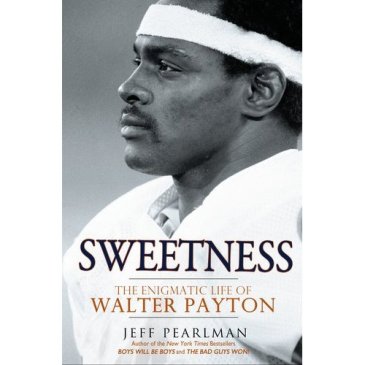Payton Bio Reveals the Bitter Side of Sweetness. So What?
By Chuck Sudo in News on Sep 29, 2011 9:30PM
 By now most of you have read the reams of ink spilled and server space taken about Jeff Pearlman's upcoming biography of Walter Payton, Sweetness: the Enigmatic Life of Walter Payton.
By now most of you have read the reams of ink spilled and server space taken about Jeff Pearlman's upcoming biography of Walter Payton, Sweetness: the Enigmatic Life of Walter Payton.
Pearlman, who wrote the book because he wanted to know about Payton off the football field -- he told Rick Telander he only knew about Payton as a Hall of Fame running back and a practical joker -- reveals in excerpts published by Sports Illustrated that Payton post-retirement was addicted to painkillers, cheated on his wife Connie and had a hard transition from football to retirement.
Local media have had a field day with the excerpts. The Sun-Times headline this morning: "Walter Payton book paints disturbing picture of Bears legend." The Tribune's header? "Walter Payton abused drugs, cheated on wife." The narrative here is that Pearlman's bio is a hatchet job that tarnishes some trapped in amber image of "Sweetness" high stepping on the field, football cradled in one arm like he's ready to throw a discus, the other arm ready to send a shattering stiff-arm into the ear hole of an unwitting tackler.
But is Pearlman - who is an amazing sportswriter - guilty of a "kill your idols" piece here? Or is he pulling the veil away from what many people had known about Payton for years?
Is anyone surprised, knowing the toll professional football takes on the bodies of the men who don shoulder pads for a living, that Payton wound up addicted to painkillers? NFL Films has given us countless moments of how much Payton left of himself on the field and how hard he drove himself in practice. Is it that hard to theorize, with the suicide of Dave Duerson still fresh in the minds of many, that maybe Payton's similar thoughts were connected with CTE?
Is anyone stunned that a man who spends an above average amount of time on the road for his job may have given in to his base urges and kept a girlfriend on the road?
Is anyone shocked by Connie Payton's revelation that Walter discussed committing suicide with her?
As WSCR-AM afternoon host Dan Bernstein noted, a biographer's job isn't to make a reader feel good. It's to inform.
To fill in the blanks.
To tell the truth.
To humanize.
What the excerpts from Pearlman's book do is begin to connect the dots between the Hosannas. To for the first time frame Payton's life away from the football field for the fans who only know him from the highlight reels. The excerpts and allegations take nothing away from Payton's charitable endeavors and the few seconds he took to make everyone who asked for his autograph to feel special. It doesn't take away from the on-field accomplishments. And it doesn't take away the pain Payton's friends, family and fans felt when he died nearly 12 years ago from bile duct cancer.
Pearlman interviewed 678 people over two years doing research for the book. Maybe we should wait until it's released and the full book is read before taking up the torches.